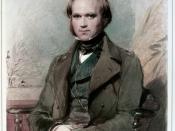Creation, Evolution and Intervention:
Which Theory is Correct?
For: Mrs. Talbot bb
Class: Socioledgy88
Date Due: Oct. 9/96
By: Neel Ghelani89
Creation, Evolution and Intervention:
Which Theory is Correct
For many years, it has been widely debated how modern man came about. In this essay, I will explain the ideas of the three main theories: Evolution, Creation, and Intervention. I will also discuss which theory I believe and why it is that I believe it.
Evolution
Evolution, in biology, is the complex process by which organisms which originated on earth change because of changes in their environment and their function on earth. The earliest fossils ever discovered are from single celled organisms which resemble today's bacteria. People who believe in evolution believe that for approximately 3.4 billion years these single celled organisms have changed and evolved into many different species including humans. This theory also states that humans and other species continue to evolve today and as a result of all these changes they will eventually become a totally different species then what they are now.
Evolutionists believe that evolution has created many organisms spread across the globe, some of which have become extinct and some of which are the plants and animals which live today.
The theory that groups of organisms can be transformed into different organisms has been suggested many times since the early 1800s, when scientists began looking for evidence that the evolution process took place. 'The most outstanding evolutionists in the nineteenth century was Jean Baptist de Lamarck, who argued that the patterns of resemblance arose through modifications of a common lineage-for example , that lions tigers and others all descendant from a cat like ancestor.' (Dickey p.42) It had already been a widely accepted theory that different animals adapt to different modes of life and...


